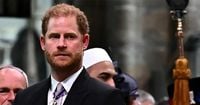On May 2, 2025, the UK Court of Appeal delivered a significant ruling regarding Prince Harry's security arrangements, dismissing his appeal to restore full-time, state-funded protection while in the UK. This decision not only highlights the complexities of royal titles and privileges but also underscores the ongoing tensions within the British royal family.
The court's ruling confirmed that the Royal and Public Protection Executive Committee (Ravec) made a lawful decision in 2020, stating that Prince Harry and his wife Meghan Markle were no longer eligible for full-time security after stepping down as senior royals and relocating abroad. According to the ruling, following their departure from royal duties, the couple lost their entitlement to state-funded protection, a privilege historically granted to working members of the royal family.
In response to the court's decision, Ravec established a "customized" security arrangement for Prince Harry, which mandates that he must provide 30 days' notice prior to each visit to the UK. Each visit would then be evaluated individually to assess the level of threat and the necessary security measures. However, Prince Harry expressed significant dissatisfaction with this arrangement, arguing that it does not adequately ensure the safety of his family.
Following the ruling, Prince Harry conveyed his deep disappointment, asserting that the decision places his family in danger and complicates their ability to return to the UK safely. He indicated that he had hoped for intervention from his father, King Charles III, to restore security measures, but noted that they are currently not in contact due to ongoing disagreements over security issues.
In an interview with BBC News shortly after the ruling, Prince Harry elaborated on his frustrations, stating, "I cannot imagine a scenario where I would feel safe bringing my wife and children back to the UK without proper security." He also expressed concern over his father's health, as King Charles is currently undergoing treatment for an undisclosed form of cancer, which adds another layer of urgency to their strained relationship.
In a statement, a spokesperson for Buckingham Palace responded to Prince Harry's comments, emphasizing that the court had thoroughly reviewed the issues at hand multiple times, consistently reaching the same conclusion. Judge Geoffrey Vos, who presided over the case, reiterated that the decisions made by Ravec regarding Prince Harry's security were reasonable, given that he is no longer a working royal.
Judge Vos stated, "It cannot be said that this reasoning is illogical or inappropriate," underscoring the legal framework that governs royal security protocols. The judge also noted that Prince Harry's security arrangements are contingent upon the circumstances of his visits to the UK, indicating that he is not entirely without protection but rather subject to a different set of rules.
The court's ruling has broader implications, as it highlights the intricate relationship between royal titles, official roles, and personal benefits such as security. Prince Harry's case raises important questions about how the royal family and the British government determine eligibility for state-funded protection. The ruling serves as a reminder that holding a royal title does not necessarily guarantee the same privileges once associated with active royal duties.
Prince Harry's legal battle for security has been ongoing for several years, with his initial lawsuit against Ravec's decision to downgrade his security level being filed in February 2024. This latest ruling marks another setback in his efforts to regain the protection he believes is necessary for his family's safety.
In addition to the legal aspects, the personal dynamics within the royal family continue to evolve. Prince Harry has publicly acknowledged the rift with his father and other family members, suggesting that some may never forgive him for his candid revelations in his memoir, "Spare," published in 2023. He expressed a desire for reconciliation, stating, "It would be wonderful to make amends," particularly in light of his father's health challenges.
Despite the ongoing tensions, Prince Harry reiterated his love for the UK and his commitment to public service, stating, "This has been and will always be my life’s work." His comments reflect a desire to remain connected to his roots while navigating the complexities of his current life away from royal duties.
The court's decision not only represents a legal defeat for Prince Harry but also serves to clarify the distinctions between honorary titles and actual rights within the royal framework. As the situation develops, it remains to be seen how these legal and familial challenges will shape the future of Prince Harry and his relationship with the royal family.

